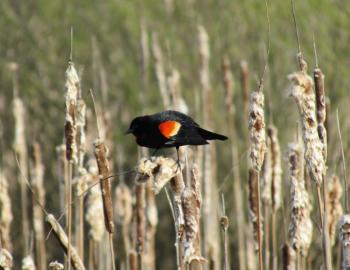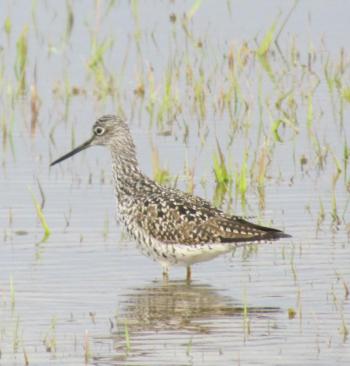Nature-based Climate Solutions Help Birds
When it comes to climate change, we know that the most important thing that we humans can do is to dramatically cut down the amount of carbon we are injecting into the atmosphere. But we also know that anything we can do to extract carbon from the atmosphere would work in concert with efforts to curb emissions and would lower the problems we are experiencing from climate change. Engineering types like to tout new-fangled contraptions to take carbon from the air, including special cement-like products that pull in carbon-dioxide and trap it within its chemical structure.
But what would you say of an even fancier contraption that doesn’t require any manufacturing or engineering, is readily available to virtually anyone with little or no cost, and not only pulls carbon-dioxide from the atmosphere but also manufactures oxygen and other products that we can use?
Sounds pretty great, doesn’t it?
Is it a fairy tale?
No, its not. We are talking about trees and other plants, of course!
Making this even more appealing is that by restoring or maintaining ecosystems full of plants, we get the best bargain of all. Not only do we achieve the benefit of carbon being pulled from the air but we gain the co-benefit of protecting or enhancing habitat that provides for birds and other wildlife that we love.
A concept called Nature-based Climate Solutions, or Natural Climate Solutions, is advocating that governments and communities begin actively recognizing, funding, and supporting such win-win solutions. Rather than feeling overwhelmed by climate change, these kinds of solutions allow us all to see that we can get multiple benefits from a single action. We can lower climate-change problems and help populations of birds and other wildlife to recover.
Nature-based solutions include actions like protecting existing forests and restoring forests from areas where they have been lost or degraded. The work of our very own Boothbay Region Land Trust to establish new preserves is a great example of a type of nature-based solution and is especially important along Maine’s coastal areas, predicted to experience some of the largest losses of forest habitat in the coming years. These are the same forests that serve as the summer nesting areas for countless numbers of our beloved birds—species like the blackburnian warbler that we can see foraging in the tops of tall spruces, with its flame-orange throat on display. Or the black-throated blue warbler singing its buzzy “I’m so lazee” as it flits about the beech forests of places like the Schmid Preserve. Reach your hand into the soil below either place where you see one of these birds and you will feel for yourself the layers of carbon that have accumulated as a result of the trees above your head that these same birds rely on for their survival.
Protecting existing wetlands and restoring lost and degraded ones is another critical piece of the nature-based solutions puzzle. Salt marshes, freshwater marshes, forested wetlands, and peatlands are all highly effective at pulling carbon from the air and storing it in plants and in the soils and peatlands below. These same wetlands are host to incredible numbers of birds for nesting in summer but also, just as critically, during migration. Swamp sparrows and common yellowthroats and marsh wrens and American black ducks and wood ducks nest in those wetlands in our region. In migration these wetlands support all sorts of other ducks and songbirds but also many migrant shorebirds like greater and lesser yellowlegs, solitary sandpipers, and least sandpipers to name just a few.
We need to all get behind supporting the double wins of solutions like these by supporting programs and funding that can make more and more of these nature-based solutions to become a reality. That means we should look to new large-scale funding for climate mitigation, roads and other transportation infrastructure, coastal resilience, and water and sewage management to include these kinds of nature-based solutions as eligible projects. No longer should nature-based solutions be receiving only the dribs and drabs of small-scale funding if we are to take on the tasks of lowering climate risks while simultaneously bringing back populations of birds and other wildlife.
It’s time for us all to stop being paralyzed by climate change and its consequences and to start enacting smart win-win solutions at the scale we need to get the job done. Those birds we love can’t do it themselves. They need us!
Jeffrey V. Wells, Ph.D., is a Fellow of the Cornell Lab of Ornithology and Vice President of Boreal Conservation for National Audubon. Dr. Wells is one of the nation's leading bird experts and conservation biologists and author of the “Birder’s Conservation Handbook.” His grandfather, the late John Chase, was a columnist for the Boothbay Register for many years. Allison Childs Wells, formerly of the Cornell Lab of Ornithology, is a senior director at the Natural Resources Council of Maine, a nonprofit membership organization working statewide to protect the nature of Maine. Both are widely published natural history writers and are the authors of the popular book, “Maine’s Favorite Birds” (Tilbury House) and “Birds of Aruba, Bonaire, and Curaçao: A Site and Field Guide,” (Cornell University Press).






























